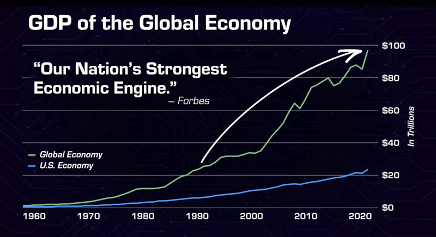Will artificial intelligence take our jobs?
It’s a growing concern about generative AI and robotics automation, and believe me, I understand where it’s coming from.
We had that very question come in from Ken, one of our loyal readers. So I’m here to answer that today!
Ken wrote:
Hey, it seems to me that if robots and AI take over everyone’s jobs, everyone is no longer going to have an income. In that case, who are the consumers of what robots and AI can produce?
Where is the economy in all this? How can the rich stay rich if no one is left to buy what they are making? It is years away, but where do you see this going?
That’s a great question, Ken. And I appreciate you for writing in!
Whenever a new technology arrives, there’s always a concern that it will take away more jobs than it creates.
However, I think you will see a net number of new jobs increase with AI.
This is what’s known as the “creative destruction” of capitalism. Some businesses will fail, while others that harness this new technology will thrive.
As Buckminster Fuller once said of new technologies: “They allow us to do more and more with less and less, until eventually you can do everything with nothing.”
There’s kind of a multiplier effect on this, because if we can increase human productivity, it leads to widespread prosperity.
Think of the impact of technologies like the printing press, the automobile and electricity — the way they transformed human life.
Let’s say you have a factory that currently employs 100 people, and you’re going to lay off 50 of them because you can put robots in the factory, and you don’t need as many workers anymore.
Well, it’s very unfortunate for those 50 people. They’re not going to have jobs. But that’s “creative destruction” in action.
Here’s what will happen: The factory owners, and potentially the remaining employees, will see their incomes go up. In that case, they’re going to start spending more. They might buy a new home or renovate the house they live in. They might increase their overall spending.
This is only happening because productivity is going up. If you look at every country in the world, the ones that are the most successful are the ones that have high levels of productivity.
That’s what it comes down to. You have to keep pushing the needle on productivity, which has been increasing at about a 2% rate over the last century. But in this decade, AI could potentially get productivity up to 3% to 3.5%!
I think that would be a massive windfall for everyone.
I also think people are worried about the dystopian effect of robots.
But think about every elderly person having a robot at home that can help them with remedial chores, for instance. There is going to be a huge benefit from the automation and AI developments that are coming.
And AI could be the most powerful wealth multiplier we’ve ever seen.
Think about when the internet first appeared in 1993 — it was used for hardly anything — mostly email.
Yes, it disrupted occupations like travel agents, book sellers, and record stores. But it also created entire new industries, like ridesharing, ecommerce and social media.
In 1993, the GDP of the global economy was $25 trillion. Now it’s about $100 trillion right now … a 4X increase.
Forbes called the internet “Our Nation’s Strongest Economic Engine.”
I believe AI will be even bigger…
A $150 Trillion AI Prediction
I predict that with AI, at the end of this decade, we are going to increase global GDP by another 50%. We’re going to get to about $150 trillion worth.
Now, your other question is: How can the rich stay rich if no one is left to buy what they’re making?
This is where government comes in.
Now, I’m not a socialist. I’m not a communist. I’m a capitalist first and foremost. But we’re going to need some regulation.
People need to be able to get food, health care and unemployment benefits — all things they’ll need because of this creative destruction of capitalism.
I’m very optimistic about what AI is going to bring to humanity. Just like other technology developments before, there will be opportunities to make a lot of money.
I think you’re starting to see it already this year with the move up in microchip stocks.
So thanks again for that question, Ken!
If you want to learn more about what AI can do, and how you can invest in its future, go here to watch my latest webinar.
There you’ll find out how to access my #1 AI stock for 2023!
And if you have any questions about AI, drop me a line at BanyanEdge@BanyanHill.com.
Until then, see you Tuesday,
 Ian KingEditor, Strategic Fortunes
Ian KingEditor, Strategic Fortunes





